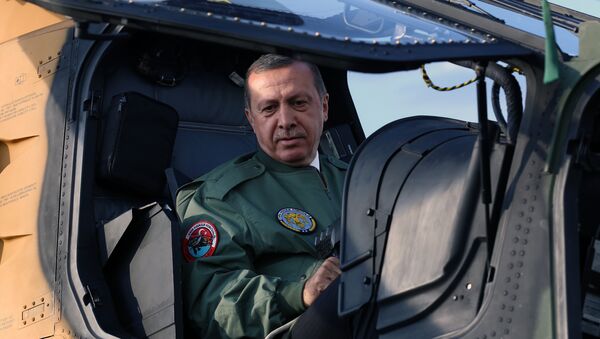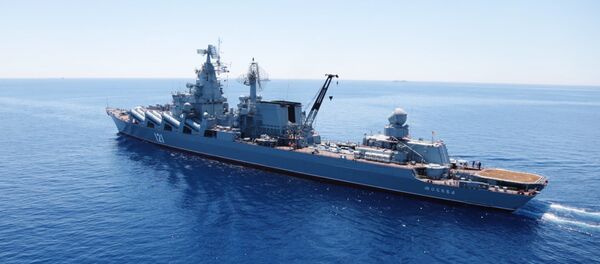On Tuesday, a pair of Turkish Air Force F-16s tailed a Russian Su-24M bomber flying over northern Syria near the Turkish border, eventually attacking and shooting it down. Ankara quickly alleged that the plane had briefly flown into Turkish airspace, charges which Moscow has denied.
After the plane was downed, one pilot –Lt. Col Oleg Peshkov, was killed by armed militants as he parachuted to the ground. His co-pilot, Cap. Konstantin Murahtin, was rescued and returned to Hmeymim Airbase in Latakia. A second Russian serviceman, Naval Infantry soldier Alexandr Pozynich, was killed in the course of the operation to rescue the surviving pilot.
With Russian President Vladimir Putin calling the attack "a stab in the back" and saying that Russia will be making use of "all security options," experts have been contemplating what other steps, both military and political, Russia might take to respond to the provocation.
To begin with, according to the expert, the issue of whether the Su-24 had actually strayed into Turkish airspace, or remained on Syrian territory throughout the incident, is secondary, and does not give Ankara the justification to shoot down the plane. "Wherever they occurred, Turkey's actions should be viewed as a diplomatic provocation."
Mirzayan explained that the attack was "not just a demonstration of the destruction of a Russian airplane by a NATO member; it is a demonstration of destruction on the eve of a scheduled meeting of a Russian-Turkish group on strategic dialogue, which was to be attended by Russian Foreign Minister Sergei Lavrov."
"Thus," the analyst explained, "Ankara has factually shown that it is not counting on any dialogue with Moscow, and is actually changing its vector of relations with Russia from one of cooperation to one of confrontation. And this means that Russia must respond within the framework of this confrontational logic."
In Mirzayan's view, the "most obvious response would be one which is symmetrical. It is no secret that Turkish planes regularly enter Syrian territory to bomb the Kurds. Perhaps it would be proper now to see some of these aircraft falling out of the sky, shot down by air defense facilities provided by Moscow, or even Russian fighters charged with protecting Syrian airspace."
And, if Russia does not want to take the risks that this imposes, the analyst notes, "it is possible, for instance, to transfer modern Russian armaments to the Syrian Kurdish forces. These weapons would a) create problems for the Turkish military operating in Syrian territory, and b) may find themselves in the hands of the Turkish Kurds working closely with their Syrian counterparts."
Then, according to Mirzayan, there is the economic option. With Egypt effectively closed to Russian tourists following the downing of the Russian Airbus over Sinai last month, Turkish businesses in the tourism sector had hoped for increasing their incomes from Russian tourists. Now, the analyst suggests, "it is possible that these hopes will to evaporate into thin air, not unlike the smoke from the Turkish missile which hit the Russian bomber."
Consequences for Erdogan
"It's obvious," according to the expert, that "Ankara understands perfectly well the above-mentioned risks. Moreover, they are aware of the strategic implications of the deterioration of relations with Moscow."
Mirzayan points out that "with the exception of Azerbaijan, Russia is presently Turkey's only neighbor with whom Ankara has if not friendly, then at least 'normal' relations. The fruits of the policy of 'zero problems with neighbors' were lost in the course of the Arab Spring, and now Turkey is in a very difficult situation geopolitically."
"Relations with the EU have been spoiled, the Americans are ready to support the Syrian Kurds (up to and including, according to some experts, Ankara's nightmare scenario: the establishment of a Syrian Kurdistan), relations with Syria are beat up, and Turkish-Iranian relations have been ruined. In this situation," the expert notes, "a conflict with Russia may mean real political isolation for Turkey, and may very well lead to serious political consequences for the president."
"Yes, in recent years Erdogan has been prone to take such pompous steps. Since the start of the Arab Spring, Turkish policy has often been characterized by excessive emotion and impulsivity. Yes, he has a very high opinion of himself, and was probably offended by the incidents of Russian military aircraft flying over Turkish territory, and by Russia's recent actions in Syria as a whole (including the elimination of pro-Turkish opposition fighters, as well as the bombing of trucks carrying oil from ISIL-controlled fields."
"However," the analyst explained, "Erdogan has never been characterized as a man who is keen on his own political suicide. Moreover, the long-standing conflict within the ruling AKP party has never been a secret. Many respectable figures have voiced their displeasure at the president, at his policies and his authoritarian management style. It is possible that they deliberately staged this provocation in order to put the president in a desperate situation, forcing him into a corner."
Ultimately, Mirzayan suggests that "it is not so important whether Erdogan personally gave the order to destroy the plane or not. The president will doubtlessly take responsibility and insist that Turkey was defending its airspace. For its part, Moscow will be forced to react in a tough but symmetrical manner. And not just to 'punish' Erdogan, but to demonstrate to everyone that one cannot shoot down Russian military aircraft with impunity, under any circumstances, and get away with it."






